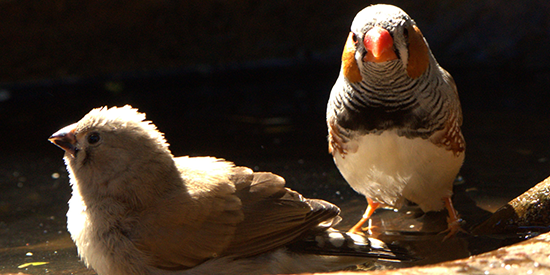Deakin research shows baby bird development harmed by sound of cars
Media release
A new study by Deakin researchers, published today in Science, proves that traffic noise exposure in baby birds directly interferes with their development, which causes severe and long-lasting harm to those chicks.
In previous studies, both baby birds and their parents were exposed to noise.
This new study reveals for the first time that noise is detrimental to the young, even when the mother isn't exposed.
Bird embryos develop outside the mother's body and can be artificially incubated, so it is possible to manipulate an embryos' experience without manipulating the mother.
Led by Dr Alizée Meillère and Dr Mylene Mariette from the School of Life and Environmental Sciences at Deakin University (Australia) and Doñana Biological Station (Spain), the researchers took advantage of this by playing sounds to the eggs of an Australian native bird, the zebra finch.
They discovered that – under otherwise optimal incubation conditions – eggs are less likely to hatch when exposed to traffic noise for five days before hatching, than when exposed to the species native song.
'Both traffic noise and song were played at the same moderate amplitude – 65 decibels, which is similar to a conversation level – but something about the acoustic characteristics of the noise caused embryonic death,' said Dr Mariette.
'After hatching, the chicks were reared normally by the zebra finch parents. However, to expose the nestlings to noise, without exposing the parents, we took the babies away during the night, and exposed them to sound in the absence of the parents.'
Being exposed to noise as a nestling was found to have a negative impact on growth and physiology.
'Nestlings exposed to noise rather than song were slower to grow and showed more severe signs of cellular damage,' said Dr Mariette. 'These negative effects were the result of both previous noise exposure before hatching and current exposure during the nestling stage.'
Interestingly, the negative effects did not end when the noise exposure stopped.
'Once the chicks had left the nest, they were reared together in an aviary and not exposed to any playback,' said Dr Mariette. 'One month after the end of exposure, we measured the juveniles again and found that noise-exposed chicks were no longer smaller than their song-exposed siblings, but the impact on their physiology had worsened. And even a year later, once the birds were adults, the cellular impact of noise was still clearly visible.'
Once the birds were adults, the researchers gave them the opportunity to breed freely in aviaries, to see who was most successful.
The results were striking.
Under the same standard conditions, birds exposed to noise pre and postnatally produced only half as many young as birds that had never experienced traffic noise. This was seen in young adults for their first breeding season, but also later in life, once they were experienced parents.
It is still not known why traffic noise is so detrimental to baby birds, but a second study, also by Dr Mariette, Developmental programming by prenatal sounds: insights into possible mechanisms | Journal of Experimental Biology | The Company of Biologists, highlights how the brain is specifically wired for permitting a direct impact of sound on physiology, and how even plants and cells are sensitive to sound and vibrations.
'Whatever the mechanism, an impact of such magnitude in a songbird, is highly concerning,' said Dr Mariette.
'We may wonder what impact noise has on species for which embryos unambiguously perceive sounds. Among many other species, including humans, foetuses become responsive to external sounds in the last trimester of gestation.
This study therefore rings alarm bells about the impact of noise pollution on biodiversity and highlights the urgent need for noise reduction measures, for the benefit of humans and wildlife alike.
Although many solutions already exist, such as using electric vehicles in cities, maintaining trees and hedges along roads to act as noise barrier, favouring train over truck transport for goods, we should but also keep our city parks and own gardens quiet by avoiding noisy tools, especially leaf blowers.'

